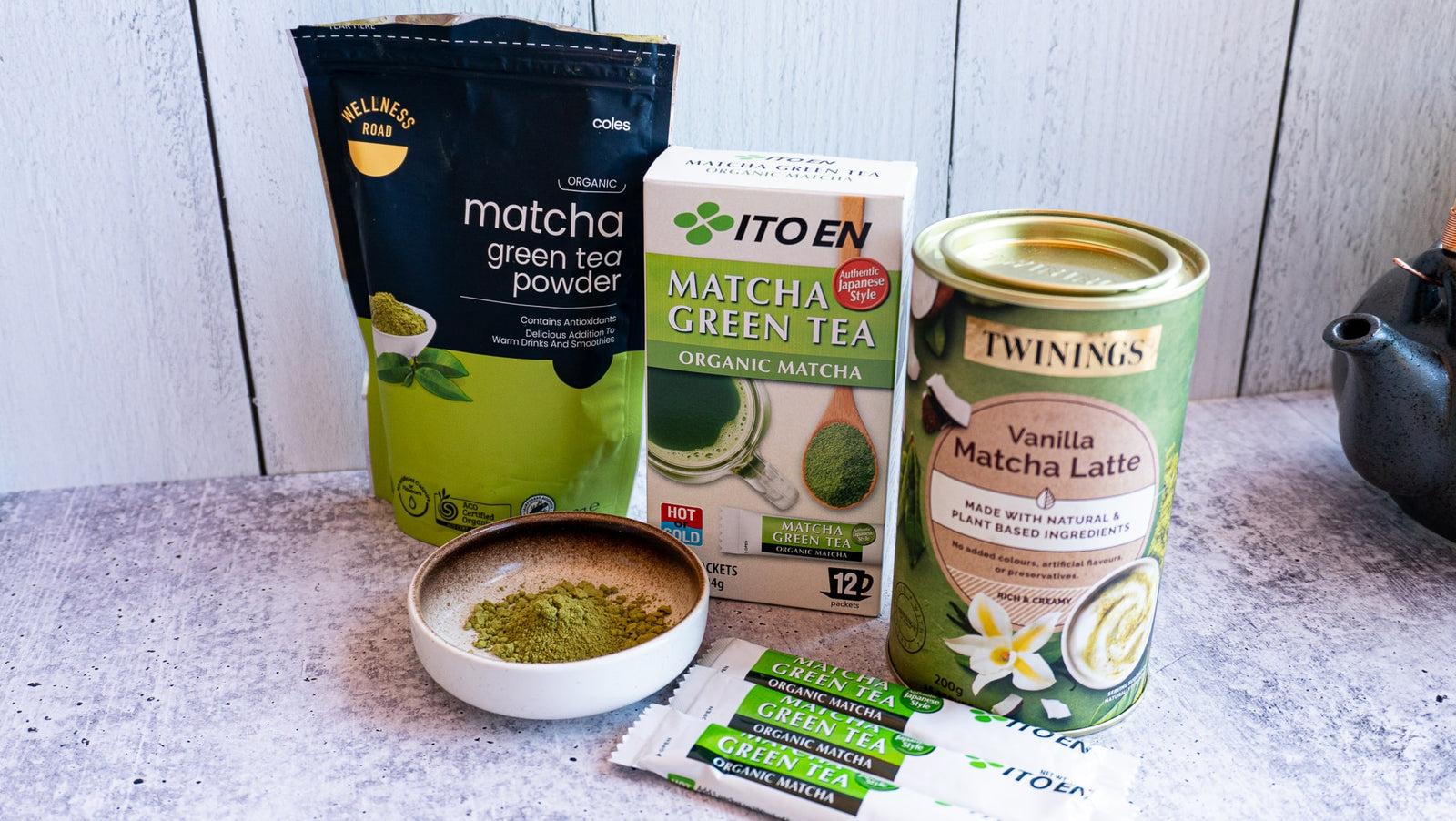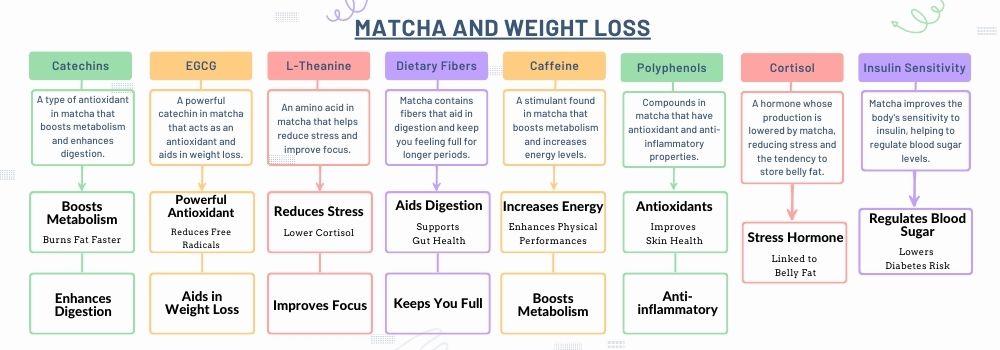One of the most frequently asked questions we hear, especially from busy women in our coworking space, revolves around the connection between matcha and weight loss. Juggling family, work, and health is no small feat, and many are searching for that extra edge to keep the balance. You may already be aware that coffee and green tea are popular choices for revving up metabolism, but matcha takes it to the next level.
This rich, green powder is a stalwart in Japanese tea culture and has gained attention for its potent nutritional benefits, making it a compelling option for anyone looking to drop some weight.
In this post, we'll delve into the science behind matcha's growing reputation as a weight-loss aid. Don't worry if some of the terms sound complex; we'll provide easy-to-understand explanations to make it easier for all of us. Plus, we'll include simple ways you can incorporate matcha into your current day-to-day meals. So let's get started and uncover the intriguing relationship between matcha and shedding those extra pounds.
How Matcha Helps in Weight Loss: The Science
Boosts Metabolism
One of the primary mechanisms behind matcha's efficacy in weight loss is its ability to accelerate metabolism. A study in the The Journal of Nutrition found that the caffeine and catechins in matcha, specifically epigallocatechin gallate (EGCG), can enhance your calorie-burning rate by a remarkable 30-40%. This heightened metabolic rate enables better energy expenditure and an increase in fat oxidation.
In simpler terms, consuming matcha can make your body more efficient at burning calories from other foods you eat. This metabolic boost makes matcha an excellent pre-workout choice, helping you burn more calories during and after exercise.
Keeps You Full Longer
Matcha has a multi-faceted approach to promoting satiety, making it an effective tool for weight management. When you consume matcha powder, you are consuming the actual grounded tea leaves. Its dietary fiber content slows down digestion, stabilising blood sugar levels and prolonging the feeling of fullness.(7)
In addition to fiber, matcha contains small amounts of protein, known for its appetite-suppressing effects. The catechins in matcha further influence hormones like leptin, which signals to your brain that you're full. Its caffeine content, while milder compared to coffee, also contributes to appetite suppression by stimulating the release of adrenaline, reducing the need for additional caloric intake.
A study published in the journal Appetite supports this, revealing that matcha enhances the sensation of fullness even after a high-calorie meal. This comprehensive blend of attributes makes matcha a natural choice for anyone seeking to manage hunger effectively.
Rich in Antioxidants
Matcha is extraordinarily rich in antioxidants known as catechins, particularly epigallocatechin gallate (EGCG).
When compared with sencha, matcha presents higher concentrations of polyamines, amino acids, such as theanine and glutamic acid, tea catechins and polyphenols, on top of that, you are consuming the whole tea leaves - referring to Japan's Food composition database (3) and other 2 studies (5), (6). Another study, published in the journal Food Research International, found that matcha contains almost 15 times the amount of antioxidants found in coffee.
These catechins have been studied for their ability to combat cell damage, promote fat oxidation, and inhibit the development of new fat cells, according to a meta-analysis in the journal Nutrients.
The high concentration of antioxidants not only fights off oxidative stress but also supports weight loss by promoting fat metabolism. (7) When compared to other beverages, matcha's antioxidant profile is significantly more potent, making it a powerful ally in both overall health and weight loss strategies.
Enhances Physical Performances
Matcha isn't just a calming beverage; it's also a catalyst for boosting your physical performance.
Building upon the extraordinary properties of catechins, specifically EGCG, scientific studies reveal another dimension of matcha's benefits—enhanced physical performance.
A study published in The Journal of Nutrition found that EGCG can notably improve exercise-induced fat loss. Additionally, research from the International Journal of Sports Medicine indicates that the unique form of caffeine in matcha can enhance physical performance by 11–20%.
Now, translating these scientific findings into everyday terms: matcha acts as a potent pre-workout supplement. Its sustained-release caffeine offers you a steady energy boost, rather than the quick spike and crash you'd experience with other caffeinated drinks. This allows for increased endurance and more effective fat-burning during your workouts, making matcha a go-to for anyone looking to optimise their physical performance.
Regulates Blood Sugar
Scientific evidence underscores the role of matcha in regulating blood sugar levels, a critical aspect of weight management. A study published in The American Journal of Clinical Nutrition shows that the catechins in matcha can help lower blood sugar levels and improve insulin sensitivity. Another study in Nutrition Research supports that matcha can help mitigate the post-meal rise in glucose, reducing the risk of insulin spikes.
Balanced blood sugar is crucial for weight management; high levels can lead to increased fat storage, while regulated levels aid in fat burn and provide steady energy. Uncontrolled high blood sugar is a risk factor for Type 2 diabetes and heart disease.
In simpler terms, this means that matcha can help your body regulate sugar intake more effectively. Unlike beverages high in sugar that lead to rapid glucose spikes and subsequent crashes, matcha provides a stable source of energy. This regulation helps to avoid the hunger pangs and cravings often associated with fluctuating blood sugar levels, giving you more control over your appetite and aiding in weight loss.
Lowers Stress and Cortisol
Let’s address the science, L-theanine in matcha has been shown to reduce stress responses and cortisol production, a hormone often linked to belly fat, according to a study in the journal Psychopharmacology. Another research piece in the Journal of Health Psychology corroborates the stress-reducing effects of L-theanine, while a study in Nutrients indicates that the polyphenols in matcha can significantly lower levels of cortisol. Given that high cortisol levels contribute to abdominal weight gain, managing stress becomes an integral part of weight loss efforts.
In more accessible terms, matcha's unique composition of amino acids and antioxidants acts as a stress shield for your body. Lower stress levels can reduce the likelihood of emotional eating or cravings for unhealthy foods, common side-effects of elevated cortisol. Hence, embracing matcha not only helps keep stress in check but also provides an edge in your weight management journey, especially in combatting stubborn belly fat.
Improves Digestion
Similarly, a review in the Journal of Clinical Gastroenterology notes that antioxidants like catechins, which are abundant in matcha, can enhance digestive health. Another research paper in the World Journal of Gastroenterology underscores the anti-inflammatory properties of matcha that benefit digestion.
Additionally, matcha’s dietary fibers have been shown to aid digestive efficiency, indirectly supporting metabolic processes that facilitate weight loss.
Simply put, this translates to a stronger, more efficient digestive system that's vital for weight management. Improved digestion allows for more effective nutrient absorption, better regulation of hunger hormones, and efficient waste elimination. The combination of catechins, anti-inflammatory properties, and dietary fibers in matcha not only optimise your digestion but also foster a balanced gut environment. This makes it easier for your body to shed extra weight.
Easy Ways to Incorporate Matcha into your Diet.
Versatility is one of matcha's strong suits, it's a perfect addition to vegan and keto diets, also it's non-GMO.
1. Matcha Smoothie
- Add 1 cup almond milk, 1 teaspoon of matcha, a handful of spinach, and a tablespoon of chia seeds to a blender.
- Blend until smooth and enjoy a keto-friendly, vegan smoothie packed with antioxidants.
2. Matcha Latte
- Heat 1 cup of almond or oat milk in a saucepan until it's warm but not boiling.
- Add 1 teaspoon of matcha powder to a cup and pour a small amount of the warm milk in.
- Whisk until smooth, then add the rest of the milk and enjoy your vegan latte!
3. Matcha Energy Balls
- In a bowl, mix 1 cup oats, 1 teaspoon matcha powder, ½ cup almond butter, and 1 tablespoon maple syrup.
- Roll the mixture into small balls.
- Refrigerate for at least 30 minutes before snacking. These are great pre-workout treats.
4. Matcha Salad Dressing
- In a small bowl, whisk together 1 teaspoon of matcha, 3 tablespoons olive oil, 1 tablespoon lemon juice, and a dash of mustard.
- Drizzle over your salad for a keto-friendly, antioxidant-rich twist.
5. Matcha Shots - Our Favourite :)
-
For the purists, matcha can be whisked in hot water for a simple but exquisite tea experience.
Easy Info Summaries of Matcha and Weight Loss Connection.
First, let's recap some terms worth remembering. We have done the visual guide that sums this blog up.
- Catechins: A type of antioxidant found abundantly in green tea and matcha. They have various health benefits, including anti-inflammatory properties and the ability to boost metabolism.
- EGCG (Epigallocatechin Gallate): A specific catechin that is highly concentrated in matcha. It is known for its powerful antioxidant properties, including aiding in weight loss and improving heart health.
- L-Theanine: An amino acid found in tea leaves, especially high in matcha. It is known for its calming effects and its ability to reduce stress and anxiety.
- Dietary Fibers: Non-digestible carbohydrates found in foods like fruits, vegetables, and grains. In the context of matcha, these fibers can aid in digestion and indirectly support metabolic processes.
- Caffeine: A natural stimulant found in tea, coffee, and many soft drinks. In matcha, it helps boost metabolism and provides a sustained release of energy without the jitters associated with coffee.
- Polyphenols: A group of plant compounds that include catechins. They have antioxidant, anti-inflammatory, and various other beneficial health effects.
- Cortisol: Often referred to as the "stress hormone," it is produced by the adrenal glands and plays a role in various functions like metabolism and regulating blood sugar. High levels are linked to weight gain, particularly in the abdominal area.
- Insulin Sensitivity: The efficiency with which your body can take up sugar from your bloodstream into your cells. Improved insulin sensitivity generally leads to lower blood sugar levels.

Our Team's Final Thoughts
Thank you for reading through and thoroughly of this blog post. We truly hope this answers some questions you might have in regards to Matcha.
In our opinion, we fell in love with matcha firstly because of its taste, and secondly its health benefits. So for us at Green Caffeine, Matcha isn’t just a trend; It’s a lifestyle.
Matcha is a scientifically-backed superfood that could be your ally in your weight loss journey. Combined with a balanced diet and regular exercise, matcha can significantly contribute to achieving your weight loss goals.
Always consult a healthcare provider before making significant changes to your diet or exercise regimen. Here's to a healthier you with the magic of matcha!
Reference:
(1) Maki, Kevin C., et al. "Green tea catechin consumption enhances exercise-induced abdominal fat loss in overweight and obese adults." The Journal of Nutrition 139.2 (2009): 264-270
(2) Venables, M. C., Hulston, C. J., Cox, H. R., & Jeukendrup, A. E. (2008). Green tea extract ingestion, fat oxidation, and glucose tolerance in healthy humans. The American Journal of Clinical Nutrition, 87(3), 778–784.
(3) Food composition database. Ministry of Education, Culture, Sports, Science and Technology. https://fooddb.mext.go.jp/.
(4) White DJ, de Klerk S, Woods W, Gondalia S, Noonan C, Scholey AB. Anti-Stress, Behavioural and Magnetoencephalography Effects of an L-Theanine-Based Nutrient Drink: A Randomised, Double-Blind, Placebo-Controlled, Crossover Trial. Nutrients. 2016 Jan 19;8(1):53. doi: 10.3390/nu8010053. PMID: 26797633; PMCID: PMC4728665.
(5) Sano T., Horie H., Matsunaga A., Hirono Y. Effect of Shading Intensity on Morphological and Color Traits and on Chemical Components of New Tea (Camellia Sinensis L.) Shoots under Direct Covering Cultivation. J. Sci. Food Agric. 2018;98:5666–5676. doi: 10.1002/jsfa.9112.
(6) A.B. Sharangi, Medicinal and therapeutic potentialities of tea (Camellia sinensis L.) – A review, Food Research International,
Volume 42, Issues 5–6, 2009
(7) Willems MET, Şahin MA, Cook MD. Matcha Green Tea Drinks Enhance Fat Oxidation During Brisk Walking in Females. Int J Sport Nutr Exerc Metab. 2018 Sep 1;28(5):536-541. doi: 10.1123/ijsnem.2017-0237. Epub 2018 Jun 19. PMID: 29345213.





